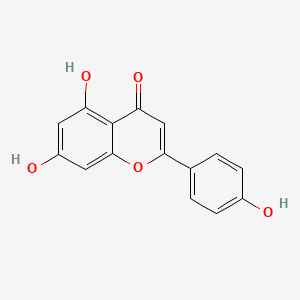apigenin
apigenin is a lipid of Polyketides (PK) class. Apigenin is associated with abnormalities such as Morphologically altered structure, Chimera disorder, Hypertensive disease, infection induced and Infection. The involved functions are known as inhibitors, Gene Expression, Process, Metabolic Inhibition and Cell Death. Apigenin often locates in Vacuole, Cytoplasmic matrix, Cytoplasm, Tissue membrane and Membrane. The associated genes with apigenin are MSMP gene, BCL2 gene, PTGS2 gene, Chromatin and SLC33A1 gene. The related lipids are Lipopolysaccharides, Steroids, 1-Butanol, agosterol A and Butyrates. The related experimental models are Mouse Model, Tissue Model, Knock-out, Xenograft Model and Disease model.
References related to genes published in Mol. Cancer Ther.
| PMID | Journal | Published Date | Author | Title |
|---|---|---|---|---|
| 22084167 | Mol. Cancer Ther. | 2012 | Budhraja A et al. | Apigenin induces apoptosis in human leukemia cells and exhibits anti-leukemic activity in vivo. |
| 15657348 | Mol. Cancer Ther. | 2005 | Torkin R et al. | Induction of caspase-dependent, p53-mediated apoptosis by apigenin in human neuroblastoma. |
| 16648554 | Mol. Cancer Ther. | 2006 | Shukla S and Gupta S | Molecular targets for apigenin-induced cell cycle arrest and apoptosis in prostate cancer cell xenograft. |
| 16648565 | Mol. Cancer Ther. | 2006 | Horinaka M et al. | The dietary flavonoid apigenin sensitizes malignant tumor cells to tumor necrosis factor-related apoptosis-inducing ligand. |
| 18645020 | Mol. Cancer Ther. | 2008 | Long X et al. | Apigenin inhibits antiestrogen-resistant breast cancer cell growth through estrogen receptor-alpha-dependent and estrogen receptor-alpha-independent mechanisms. |
| 23861346 | Mol. Cancer Ther. | 2013 | Zhu Y et al. | Inhibition of ABCB1 expression overcomes acquired docetaxel resistance in prostate cancer. |
| 24126433 | Mol. Cancer Ther. | 2013 | Shao H et al. | Apigenin sensitizes colon cancer cells to antitumor activity of ABT-263. |
